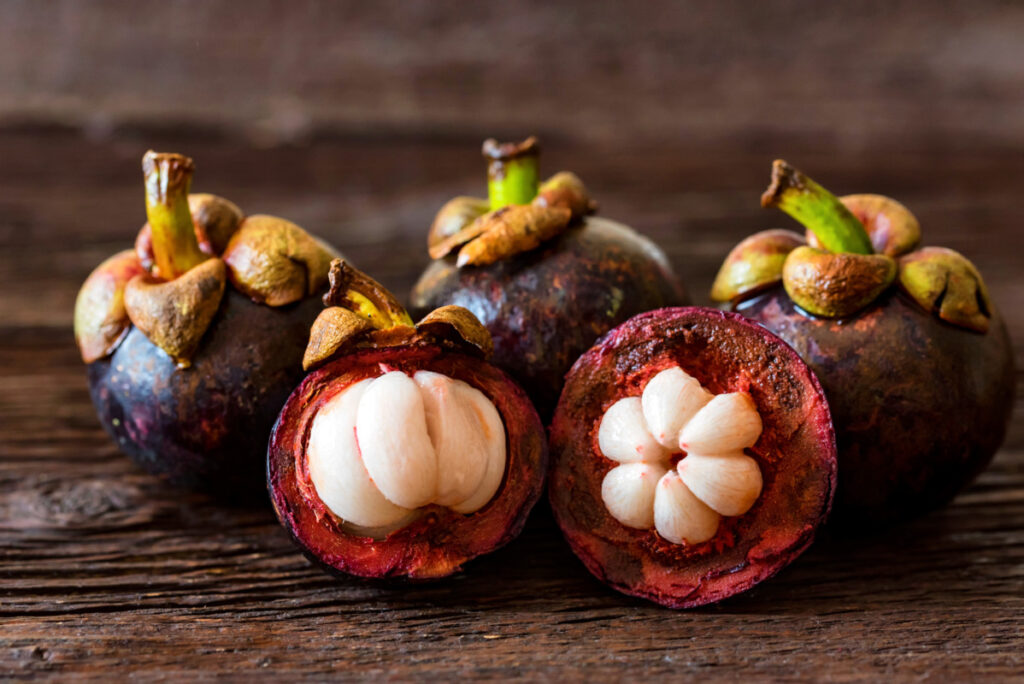Mangosteen, the “queen of fruits,” reigns supreme in the realm of tropical delicacies, captivating the world with its exquisite flavor, unique appearance, and rich cultural significance. Native to the lush rainforests of Southeast Asia, this exotic fruit has long been cherished for its delicate taste, refreshing aroma, and reputed health benefits. In Indonesia, mangosteen holds a special place, not only as a culinary gem but also as a symbol of abundance and prosperity.
A Culinary Delight
Mangosteen, scientifically known as Garcinia mangostana, is a round, purple fruit with a thick, leathery rind that encases a cluster of juicy, snow-white segments. These segments, enveloped in a thin membrane, boast a delicate balance of sweetness and tanginess, often described as a blend of citrus, peach, and lychee. The flesh is refreshingly juicy and melts in the mouth, leaving a lingering sweetness that lingers on the palate.
In Indonesia, mangosteen is savored as a fresh treat, often enjoyed as an after-meal dessert or a refreshing snack. Its unique flavor profile complements a variety of dishes, adding a touch of tropical elegance to fruit salads, ice creams, and even savory preparations.
Beyond the Culinary Realm
The significance of mangosteen extends beyond its culinary applications, as it plays a vital role in traditional Indonesian medicine and cultural practices. Its rind, rich in tannins and xanthones, has been used for centuries to treat various ailments, including diarrhea, skin infections, and inflammation.
Mangosteen also holds symbolic importance in Indonesian culture, often associated with purity, prosperity, and good fortune. Its deep purple hue is believed to symbolize royalty and wealth, making it a popular offering during festivals and celebrations.
Cultivation and Production
Mangosteen thrives in tropical climates with high humidity and abundant rainfall, making Indonesia an ideal growing environment. The cultivation of mangosteen is primarily centered on smallholder farmers, who manage a significant portion of the country’s production.
The mangosteen tree is relatively slow-growing, taking up to 10 years to mature and bear fruit. The harvesting process is delicate, involving the careful handpicking of ripe fruits to prevent damage to the delicate flesh. Once harvested, mangosteen is typically consumed fresh or minimally processed to preserve its unique flavor and texture.
Preserving a Culinary Heritage
Mangosteen holds a special place in Indonesian culture and cuisine, and its cultivation and use remain an integral part of the nation’s agricultural and culinary heritage. As Indonesia strives to preserve its rich cultural traditions, mangosteen continues to be a cherished fruit, showcasing the diversity and vibrancy of Indonesian cuisine to the world.
Efforts are underway to promote sustainable mangosteen farming practices that protect the environment and ensure the long-term viability of this valuable crop. Additionally, initiatives are being implemented to support smallholder farmers, ensuring their access to resources and market opportunities.
Conclusion
Mangosteen is more than just a tropical fruit; it is a symbol of Indonesia’s rich cultural heritage, natural beauty, and agricultural prowess. From its lush rainforest origins to its revered presence in Indonesian cuisine and cultural practices, mangosteen has left an indelible mark on the nation’s tapestry. As Indonesia continues to cherish this remarkable fruit, the world continues to savor its unique flavor and aroma, a testament to Indonesia’s enduring contribution to the global culinary landscape.

